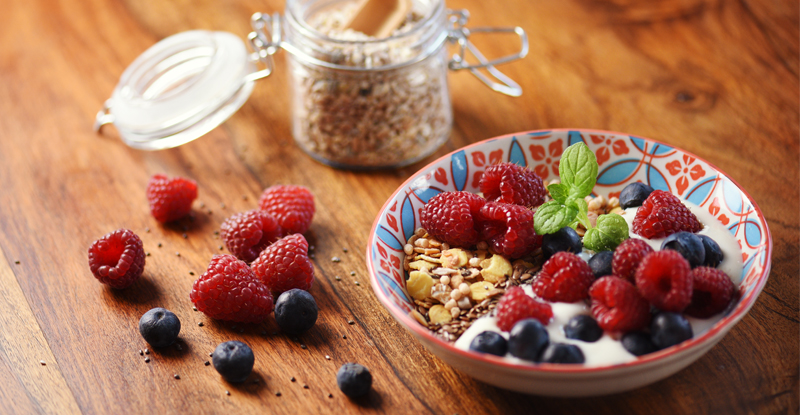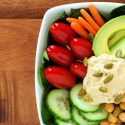Leaky Gut Syndrome and digestive health balance

You may have heard that your gut is your second brain, and this may not be too far from the truth in a sense. Research has shown repeatedly that the foods we eat impact our physical and mental health. This includes our gut microbiome and even our moods! What if we could strategically choose foods to improve the bacteria and health of our gut so that we could be healthier physically and mentally?
An unhealthy gut lining, also known to some as “Leaky Gut Syndrome” can cause inflammation and imbalances in the gut flora (normal bacteria) that can lead to problems within the digestive tract and beyond.
What is Leaky Gut Syndrome?
The condition, “leaky gut”, is getting a lot of attention in medical blogs and social media lately. However, many doctors do not recognize this term. Leaky gut, also called increased intestinal permeability or intestinal hyper-permeability, is somewhat new and most of the research occurs in basic sciences. So, what exactly is “leaky gut”? Inside our stomachs, we have an extensive intestinal lining covering more than 4,000 square feet of surface area. When functioning properly, it creates a tight barrier that controls what gets absorbed into the bloodstream. An unhealthy gut lining may have large cracks or holes, allowing partially digested food, toxins, and bacteria to penetrate the tissues below it. This may cause symptoms of inflammation such as gas, bloating, cramps, food sensitivities, constipation, diarrhea, migraines, skin conditions, fatigue, asthma, joint pain, to name a few.
Everyone has some degree of leaky gut, as this barrier is not completely perfect. Some of us may have a genetic predisposition and may be more sensitive to changes in the digestive system, but our DNA is not the only factor. Our lifestyle today may be the main contributor of gut inflammation.
Common factors that can damage gut lining/disruption:
- Standard American Diet (SAD)
- Low in fiber
- High in sugar
- High in processed foods
- High in saturated fats
- Heavy alcohol use
- Tobacco use
- High levels of unmanaged chronic stress
- Infections (H. pylori, Salmonella, sepsis, etc.)
- Medications (Aspirin, NSAIDs)
Steps to Take to Improve or Heal Your Gut/Gut Lining:
- Discuss symptoms with your Primary
Care Provider (PCP)
- May provide strategies to relieve symptoms and reduce inflammation
- Testing for possible food sensitivities or intolerances (Example: Gluten or Dairy)
- Referral to a gastroenterologist for additional testing
- Clean up your diet!
- Incorporate (slowly) more fiber-rich foods
- Reduce sugar intake
- Limit processed foods
- Reduce saturated fat intake
- Reduce or eliminate alcohol intake
- Incorporate foods with prebiotics (feed the good bacteria) and
probiotics (“good” bacteria or live cultures)
- Probiotic-Rich Foods: sauerkraut, kimchi, sourdough bread, kefir, yogurt, kombucha, Miso, Tempeh, fermented soft cheeses, acidophilus milk, buttermilk, sour pickles, and probiotics in supplement form
- Prebiotic-Rich Foods: Asparagus, Jerusalem artichokes, bananas, oatmeal, red wine (in moderation), onions, garlic, leeks, soybeans, whole-wheat foods, honey, maple syrup, and legumes to name a few
- Keep a food journal
- Record everything you eat and how you feel; you may discover foods that cause unpleasant symptoms (Example: dairy, gluten-containing foods, peanuts)
- If you think a specific food may be the culprit, try eliminating it for several weeks; then slowly add it back in to your diet and monitor symptoms again
- This is a process and you must be patient
- Stick to a regular exercise routine
- Studies have advised that taking a 15-to 20-minute walk after a meal can aid in digestion
- New Physical Activity Guidelines
- Learn techniques to better manage stress
- Try our Odyssey by UPMC mobile app
- Download and select our Stress Management program for strategies to manage stress
- Call a UPMC Care Manager @ 1-800-807-0751 for more information on Stress Management skills and our Less Stress Program
- Check out other MyHealth Matters Articles:
- Try our Odyssey by UPMC mobile app
- Quit using tobacco products
- Ready to Quit? Call a UPMC Care Manager @ 1-800-807-0751 for more information on quitting tobacco use and our Ready to Quit Program
- Check out other MyHealth Matters Articles:
- Reduce risk of bacterial/viral
infections
- Wash your hands thoroughly after visiting the restroom and before touching food
- Reduce exposure to other people who are ill
- Avoid eating raw shellfish, raw meat, and unpasteurized milk
- Disinfect hard surfaces (such as counters, faucets, and doorknobs)
- Reduce use of NSAIDs when able
- Use only what you need
- Stop as soon as you can
- Soothe without pills, when possible. Deploying other remedies such as exercise, weight loss, physical therapy, joint-supporting splints, massage, and acupuncture are all possible ways to reduce pain and reliance on pain relievers.
In Summary
Your gut is a massive and complex system and science is constantly finding new ways that our guts can influence other systems of our bodies, such as our hearts and brains. We have learned quite a bit about how important our gut health is, but there is still a lot we don’t know yet. We don’t always have perfect control of our health due to our environment and our genetic makeup, however, we can reduce risk of developing negative health conditions (such as leak gut and associated symptoms) through the choices that we make when it comes to lifestyle.
References:
- https://news.harvard.edu/gazette/story/2014/01/your-guts-what-you-eat-too/
- https://www.health.harvard.edu/blog/leaky-gut-what-is-it-and-what-does-it-mean-for-you-2017092212451
- https://www.ncbi.nlm.nih.gov/pmc/articles/PMC6381324
- https://www.ncbi.nlm.nih.gov/pmc/articles/PMC4290017/
- https://www.mayoclinic.org/medical-professionals/digestive-diseases/news/food-sensitivities-may-affect-gut-barrier-function/mac-20429973
- https://www.webmd.com/digestive-disorders/features/leaky-gut-syndrome#1
- https://www.ncbi.nlm.nih.gov/pmc/articles/PMC5440529/
- https://www.nhs.uk/conditions/leaky-gut-syndrome/
- https://www.health.harvard.edu/blog/putting-a-stop-to-leaky-gut-2018111815289
- https://www.sciencedirect.com/science/article/pii/S152169181730118X?via%3Dihub
- https://www.webmd.com/digestive-disorders/ss/slideshow-probiotics
- https://www.eatright.org/food/vitamins-and-supplements/nutrient-rich-foods/prebiotics-and-probiotics-creating-a-healthier-you
- https://www.mayoclinic.org/diseases-conditions/viral-gastroenteritis/symptoms-causes/syc-20378847
- https://www.health.harvard.edu/heart-health/heart-safer-nsaid-alternatives


